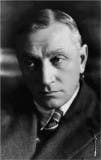1909 graduated from the Alexandra Theatre School in St Petersburg. 1909-13 he acted at the theatre of the Literary and Art Society in St Petersburg, 1914-20 - in Nizhny Novgorod, Penza, and was the head of the Grodno Suppression. 1924-41 Director and actor at the State Theatre. 1931-35 also directed at the Drama Theatre in Šiauliai. 1924 founded (with K. Glinskis) the Acting School in Kaunas and taught there. On his initiative in 1927 he founded the magazine 7 Days of Art. 1944-49 Chief director of the Lithuanian Drama Theatre (until 1947 Vilnius Drama Theatre), 1947-48 artistic director, director and head of the theatre studio. 1947-49 Deputy of the Supreme Soviet of the LSSR, chairman of the Theatre Society and the Playwrights' Section of the Writers' Union.
He took care of Lithuanian drama - he staged 46 works by 22 Lithuanian writers, the most important of which were V. Krėve's Skirgaila (1924, played Kelleris) and Žentas (1931), P. Vaičiūnas's Tuščios pastangos (1926, played Roma Giedrius), Aukso žaismas (1932), V. Mykolaitis-Putinas's Valdovas (The Ruler) (1929), A. Griciaus's Palanga (1932), K. Binkio Atžalynas (1938). He also staged plays by foreign playwrights. Čapek's R.U.R. (1927), Molière's The Alleged Sick Man (he played the Theatre Director), Pirandello's By the Way or So (he played Ponce, both in 1928), F. Schiller's Don Carlo, R. Blaumans' The Indranians (both in 1931), A. Chekhov's The Cherry Orchard (1937, 1945), Gorky's Enemies (1946, USSR State Prize 1947, with others), Yegor Bulychev (1948), A. Ostrovsky's The Forest (1948, played Neschiastlivtsev). His direction was based on the principles of Russian realistic acting. The performances are characterized by expressive theatrical form, emotionality; comic interludes abound.
